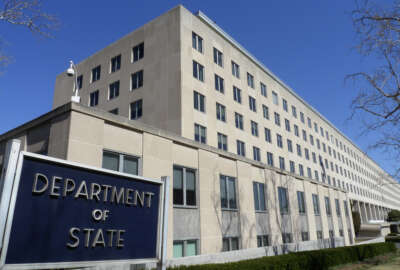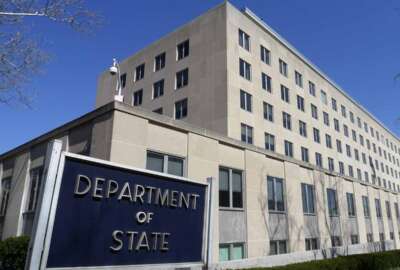The State Department seeks fresh talent for its diplomatic security operation
The State Department offers tuition assistance and a stipend to graduate students who are awarded William D. Clarke, Sr. Diplomatic Security Fellowships
Best listening experience is on Chrome, Firefox or Safari. Subscribe to Federal Drive’s daily audio interviews on Apple Podcasts or PodcastOne.
The State Department has several annual fellowship programs designed to bring in new talent. We’ve been bringing you their stories here on the Federal Drive with Tom Temin. Today we’re talking about the William D. Clarke, Sr. Diplomatic Security Fellowships. And here with the details, the Assistant Secretary of State for Diplomatic Security, Gentry Smith.
Interview transcript:
Tom Temin
And let’s talk about diplomatic security fellowships. Is this a way of recruiting people outside of the normal channels to get the numbers of people you need to fill the ranks?Gentry Smith: Yeah, we’re really excited about this opportunity with the William D. Clarke fellowship. Your main goal is to focus on giving individuals an opportunity to come on board as a special agent with the Diplomatic Security Service. And with a special focus towards looking at underrepresented communities and can provide this opportunity for graduate students to participate in the program with the end result being entree into cadre as a as a special agent with the Diplomatic Security Service.
Tom Temin: All right, and maybe just preview for us briefly who William D. Clarke, Sr. was for those that may not recall.
Gentry Smith: William D. Clarke, Sr. was the first diplomatic security special agent to reach the rank of ambassador. He served as ambassador for Eritrea, but also had a outstanding career during his time in the Diplomatic Security Service. And so having this opportunity to have the fellowship named after him with a particular focus is an honor to the organization and to what he represented.
Tom Temin: All right, so you’re looking for graduate students or people that are pursuing a master’s degree. And you mentioned underrepresented communities. Is there a focus on say, HBCUs, and colleges of that nature in the recruiting here?
Gentry Smith: It’s much broader than that as well. And when we say underrepresented communities, we mean, the broad spectrum of underrepresented communities, you know, diversity, equity, inclusion nexus is, of course, one of the focuses with the department that gets a lot of attention, and one that the secretary has stated is one of his commitments. So we’re happy to partner in this arrangement with the focus on bringing in personnel from varying backgrounds that will provide diversity within a particular organization of the Diplomatic Security Service as well.
Tom Temin: All right, and the fellows that are selected, I guess, their men and women, they get some benefits of cash while they’re doing this work.
Gentry Smith: Yeah, it’s based on the two year graduate program, of which $24,000 is available for tuition. And then additional funds available for room board expenses in the area of $18,000 per year.
Tom Temin: And how many are you looking for?
Gentry Smith: To answer that question that you’re gonna ask about how many we’re looking for? The cohort is designed in its initial phase to bring on eight individuals in our first group, and we’ll see how we do with that. And we’re looking to have those personnel on up and running for 2023.
Tom Temin: And what areas of training will they need to complete successfully to become Diplomatic Security Service special agents?
Gentry Smith: Pursuing their undergraduate degree. That is one of the other diverse elements of personnel serving in diplomatic security, particularly personnel coming from various backgrounds of study. So the only requirement is to complete their graduate studies. The program is set up within that there will be, of course, pursuit of the degree within the school. But there are also two iterations where the individuals get to interact with personnel here in the department. During the first session, they would be in a domestic office, generally here in Washington, DC, where they have a semester of interacting with personnel within diplomatic security. The second iteration would be at an overseas location at one of our embassies and consulates around the world. And again, having a semester of interacting in that setting. I guess one of the other advantages is throughout the program, you know, the candidates would have access to mentors and persons already operating within the profession that they could interact with, learn more about the organization and to help them in their development as they progress through the program.
Tom Temin: We’re speaking with Gentry Smith, he is the assistant secretary of state for diplomatic security. And so after they are appointed, that’s when they get to do the fun stuff like firearms training and learning to drive sedans backwards really fast.
Gentry Smith: We will run through the entire gambit of training that every special agent goes through called our basic special agent course. And once they complete that course they are then fully-fledged special agents with the Diplomatic Security Service with then the opportunity to serve fully both domestic and abroad.
Tom Temin: And what is the life like in being a Diplomatic Security Service agent, it sounds like a combination of cop, secret service agent, FBI agent and diplomat all kind of rolled into one.
Gentry Smith: But the Diplomatic Security Service is the law enforcement and security arm of the Department of State. And we do a variety of different things under that umbrella of law enforcement and security, both domestic and around the world. Globally, we’re in over 270 locations around the world, located in more than 175 countries around the world, with the responsibility of protecting our personnel who serve in our missions abroad, protecting our national security information, and also ensuring the protection of those facilities in which we serve. For the special agents, security engineering officers, security engineers and security technical specialists that serve around the world. There’s also a lot of interaction with other law enforcement personnel, and technical and physical security personnel who are located in those countries around the world, interfacing with them all to do the things that are within our mission of keeping our people, our information and our facilities safe. On the domestic side again, the special agents serve at our field offices and resident agencies around the country, we have a responsibility for protecting U.S. travel documents, mainly U.S. passports and visas. But we also understand our role in protecting foreign visitors who are guests in the U.S. whether those are diplomats who are assigned here, where we are in our protective liaison capacity, we’ll make sure that we can address any concerns that foreign diplomats who reside here and work in the U.S. may have. And of course, any high level foreign dignitaries who visit the U.S. We also partner with a lot of those law enforcement agencies that you mentioned earlier on issues of special concern that cross both of our paths.
Tom Temin: And how many people are in the Diplomatic Security Service? And is there a contractor component under them that fills in some of the jobs?
Gentry Smith: Yeah, we have both foreign service personnel, we have civil service personnel. And we have persons who also work with us under contract, both domestically and abroad. Around the world. That number comes to somewhere around 50,000 individuals, when you look at the over arching group that makes up the Diplomatic Security Service for the special agent cadre that’s closer to around 2000, 2000-plus special agents. But as I say, then we have security engineering officers, diplomatic couriers and other technical specialists that help us to keep people safe and secure.
Tom Temin: All right. And of course, you are the assistant secretary of state and oversee all of this, do you ever get a chance to just step outside and walk a beat and take a look around and then go back into the office?
Gentry Smith: My days of walking beats are long gone. But I do get the opportunity to interact with all the various levels of the professionals and experts that we have within our organization, I travel quite a bit just to you know, have that face-to-face exchange and to get to see what’s going on in various regions, just to make sure that both the personnel who are serving there know of our availability, but also to have that interaction with the people that are out there doing the job. It’s an enjoyable job. I’ve been in this business for well over 30 -plus years and still enjoy it every day.
Tom Temin: Alright, Gentry Smith is the assistant secretary of state for diplomatic security.
Copyright © 2024 Federal News Network. All rights reserved. This website is not intended for users located within the European Economic Area.
Tom Temin is host of the Federal Drive and has been providing insight on federal technology and management issues for more than 30 years.
Follow @tteminWFED
Related Stories

State Department looking to pay college students who speak fluent computer




